- cross-posted to:
- retrocomputing@lemmy.sdf.org
- cross-posted to:
- retrocomputing@lemmy.sdf.org
cross-posted from: https://lemmy.capebreton.social/post/497698
In 1994, Ted Leonsis was the head of the new media marketing firm he created, Redgate Communications, spun out six years earlier from a CD-ROM based computer shopping business. Redgate dealed in digital media—sometimes called new media—new territory in the marketing world. And he was pretty good at it. That year, he went out to lunch with one his investment bankers, Dan Case. Case mentioned that his brother Steve was working at a small internet company looking to bring internet services to the mainstream. They had only just finished rebranding to a new name, with a new purpose, America Online.



God, I remember the commercials where some dumb kid would push this narrative: “AOL is the Internet!” They would just directly say the lie outright. And after polluting the world in AOL CD-ROMs, it worked for a time.
Such a scummy corporation. I’m glad Time-Warner got burned when they bought them for a high price, right at the peak where they were going to drop like a cliff in popularity.
I remember the CDs, they were everywhere lol. Luckily my brother was tech savvy and when I got my first PC, I asked what the deal was with AOL links and he laughed saying no one uses “AOL internet”. I remember they all but died in a year.
Sure it was marketing speak, but Usenet’s eternal September started in late 1993, and that’s also about when AOL opened up their email to the internet. By late 94 there was a functional browser and they were effectively an ISP with extra stuff (that no one wanted anymore). In some ways, the “AOL is the Internet” angle was an admission that “the Internet” was what people wanted, and AOL itself was redundant. It probably did cause people to spend more on internet service than they needed, but it was already a rear-guard action, whether AOL knew it or not.
I remember a very specific commercial where they were listing stuff that was “on” AOL, most or all of which was just on the broader actual Internet , and then closed with some pitch like, “AOL has things you can’t get anywhere else,” clearly implying everything they just listed was exclusive to AOL. I couldn’t understand why every other ISP wasn’t suing them into oblivion for that crap.